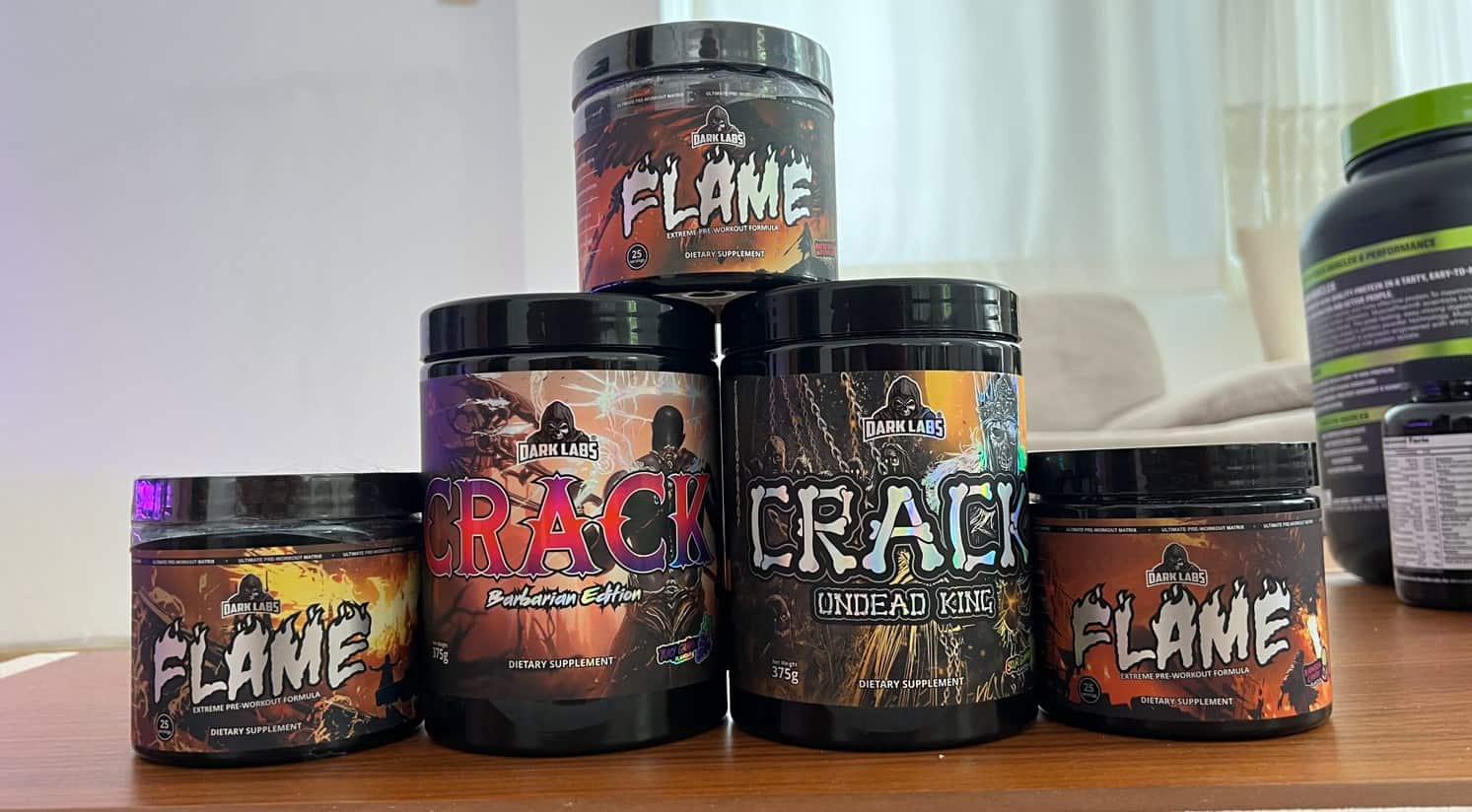
A new supplement or compound always promises to boost performance, increase muscle mass, or speed recovery.
Although this isn't a new supplement, it always finds a way back into supplements, and that's DMAA.
But what exactly is DMAA, and is it a steroid?
Let's delve into the science and find out.
DMAA, or 1,3-dimethylamylamine, is a synthetic compound often found in pre-workout supplements and fat burners.
Despite some misconceptions, it is not a steroid.
It's a stimulant that can potentially enhance athletic performance but carries significant health risks.

DMAA, short for 1,3-dimethylamylamine, is a synthetic drug originally used as a nasal decongestant.
Today, it's often found in dietary supplements used for attention deficit hyperactivity disorder (ADHD), weight loss, improving athletic performance, and bodybuilding.
Some manufacturers claim that DMAA naturally comes from rose geranium oil and list it as such on their product labels.
However, according to the FDA, no reliable science indicates that DMAA exists naturally in plants.
Laboratory analysis suggests that the DMAA in these supplements is artificially added.
Recommended reading: What Is Eria Jarensis?
The short answer is no, DMAA is not a steroid.
It's an amphetamine derivative. Steroids are a large class of organic compounds with a characteristic molecular structure containing four rings of carbon atoms.
They include many hormones, alkaloids, and vitamins.
DMAA does not have this structure and does not function like a steroid.
So, while it may be found in some bodybuilding supplements, it's not because it's a steroid but because of its stimulant effects.

Steroids are a class of drugs that mimic the effects of naturally occurring hormones in the body.
They often enhance muscle growth, improve athletic performance, and treat various medical conditions.
While DMAA can enhance athletic performance by increasing energy and focus, it does not have the muscle-building effects that steroids do.
While both DMAA and steroids can enhance athletic performance, they do so in very different ways.
Steroids work by mimicking the effects of testosterone, a hormone that promotes muscle growth and strength.
This can significantly increase muscle mass and physical performance, especially with strength training.
On the other hand, DMAA works primarily as a central nervous system stimulant.
It can increase heart rate and blood pressure, increasing energy and focus.
However, it does not have the same muscle-building effects as steroids.
In terms of safety, both DMAA and steroids come with risks.
Long-term use of steroids can lead to various health problems, including heart disease, liver damage, and mental health issues.
DMAA, meanwhile, has been linked to serious cardiovascular events, including heart attacks and strokes.
Steroids are a broad class of organic compounds, including many hormones, alkaloids, and vitamins.
In the context of athletic performance, the term "steroids" is often used to refer to anabolic-androgenic steroids (AAS), a group of synthetic substances that mimic the effects of testosterone in the body.
Bodybuilders and athletes often use AAS to increase muscle mass and improve performance.
However, they can also have serious side effects, including heart disease, liver damage, and mental health issues.
It's important to note that while DMAA can enhance athletic performance, it does not fall into the category of anabolic-androgenic steroids.
It is a stimulant, not a hormone, and its effects on the body are quite different from those of AAS.
While DMAA and steroids can enhance athletic performance, they are very different substances with different effects on the body.
DMAA is not a steroid; its use comes with its risks and considerations.
Some athletes have used DMAA for its performance-enhancing effects.
It's thought to increase energy, concentration, and metabolism, potentially improving workout intensity and fat loss.
However, it's important to note that DMAA was added to the World Anti-Doping Agency's prohibited substances list in 2010.
Therefore, competitive athletes should avoid taking it.

There's no doubt that DMAA can have a significant impact on athletic performance.
Its stimulant effects can increase energy, focus, and motivation, making it easier to push through tough workouts.
However, these benefits must be weighed against the potential risks.
Overuse of DMAA can lead to cardiovascular problems, and it's also been linked to several cases of liver failure.
Despite these risks, some athletes continue to use DMAA due to its potent performance-enhancing effects.
However, it's important to note that these benefits will likely be short-lived.
Over time, the body can tolerate DMAA, meaning that higher and higher doses are needed to achieve the same effects.
This can increase the risk of side effects and make stopping the drug harder.
Read: What Is DMAA Pre-Workout?
The safety of DMAA is a significant concern.
It can narrow blood vessels and arteries, raising blood pressure and leading to cardiovascular problems such as shortness of breath, arrhythmias, tightening in the chest, and even heart attack.
It can also cause seizures and other neurological and psychological conditions.
Regarding legality, DMAA is considered a drug in Canada and is not permitted in dietary supplements or natural health products.
The Food and Drug Administration (FDA) considers DMAA supplements illegal in the United States.
DMAA, or 1,3-dimethylamylamine, is a component of many hardcore pre-workout supplements.
Initially developed as a nasal decongestant, it has since been associated with numerous adverse effects, leading to its ban by the US military and the World Anti-Doping Agency.
The safety of DMAA has been a topic of concern in the scientific community.
It has been associated with various adverse effects, including tachycardia, nausea, vomiting, agitation, tremor, dizziness, headache, and chest pain.
More serious and life-threatening effects, such as hemorrhagic stroke, hepatotoxicity, myocardial infarction, and even death, have also been reported.
DMAA is often not taken alone but as a component of weight-loss supplements, several of which also contain caffeine.
There is a suggestion that a synergistic effect between DMAA and caffeine may be responsible for some of the adverse effects reported.
Given the potential risks associated with DMAA, it is crucial to approach its use cautiously.
More research is needed to fully understand the safety profile of DMAA, especially when combined with other substances like caffeine.
For more detailed information, you can visit the full study on the safety of DMAA.
The appropriate dosage of DMAA can vary depending on several factors, including the individual's health status, body weight, and other substances in the supplement.
It's important to note that due to the potential health risks associated with DMAA, it's crucial to follow the recommended dosage provided by the manufacturer or a healthcare professional.
DMAA has been the subject of numerous scientific studies, many of which have focused on its potential adverse effects.
However, research is also exploring its potential benefits, particularly in weight loss and exercise performance.
Despite the potential benefits, the safety concerns associated with DMAA have led to its ban in many countries and organizations.
As such, the use of DMAA should be approached with caution, and individuals should consult with a healthcare professional before starting any supplement regimen that includes DMAA.
Despite the controversy surrounding DMAA, it is still available in some dietary supplements.
If you're considering trying a supplement that contains DMAA, it's important to do your research and choose a reputable supplier.
For a list of DMAA supplements, you can visit here. If you're interested in buying DMAA or DMHA online, you can check out this page.
Remember, it's always important to consult with a healthcare professional before starting any new supplement regimen, especially one that includes substances like DMAA.
1. What is DMAA? DMAA, or 1,3-dimethylamylamine, is a synthetic compound often found in pre-workout supplements and fat burners. It's a stimulant that can potentially enhance athletic performance.
2. Is DMAA a steroid? No, DMAA is not a steroid. It's an amphetamine derivative.
3. Is DMAA safe to use? The safety of DMAA is a significant concern. It can narrow blood vessels and arteries, raising blood pressure and leading to cardiovascular problems such as shortness of breath, arrhythmias, tightening in the chest, and even heart attack. It can also cause seizures and other neurological and psychological conditions.
4. Is DMAA legal? DMAA is considered illegal in dietary supplements or natural health products in many places, including the United States and Canada.
5. Can DMAA enhance athletic performance? Some athletes use DMAA for its potential performance-enhancing effects, such as increased energy, concentration, and metabolism. However, it's important to note that DMAA was added to the World Anti-Doping Agency's prohibited substances list in 2010.
DMAA is a synthetic stimulant, not a steroid.
While it may be found in some bodybuilding supplements, it's not because it's a steroid but because of its stimulant effects.
However, it's not recommended due to its significant health risks and legal status in many places.
Useful Links
 About FitFrek
About FitFrekFitFrek operates as an independent platform, offering comprehensive workouts, programs, routines, guides, and unbiased reviews to accelerate your progress. We pride ourselves on our honesty, delivering straightforward and candid insights. FitFrek does not offer medical advice, diagnosis, or treatment services.